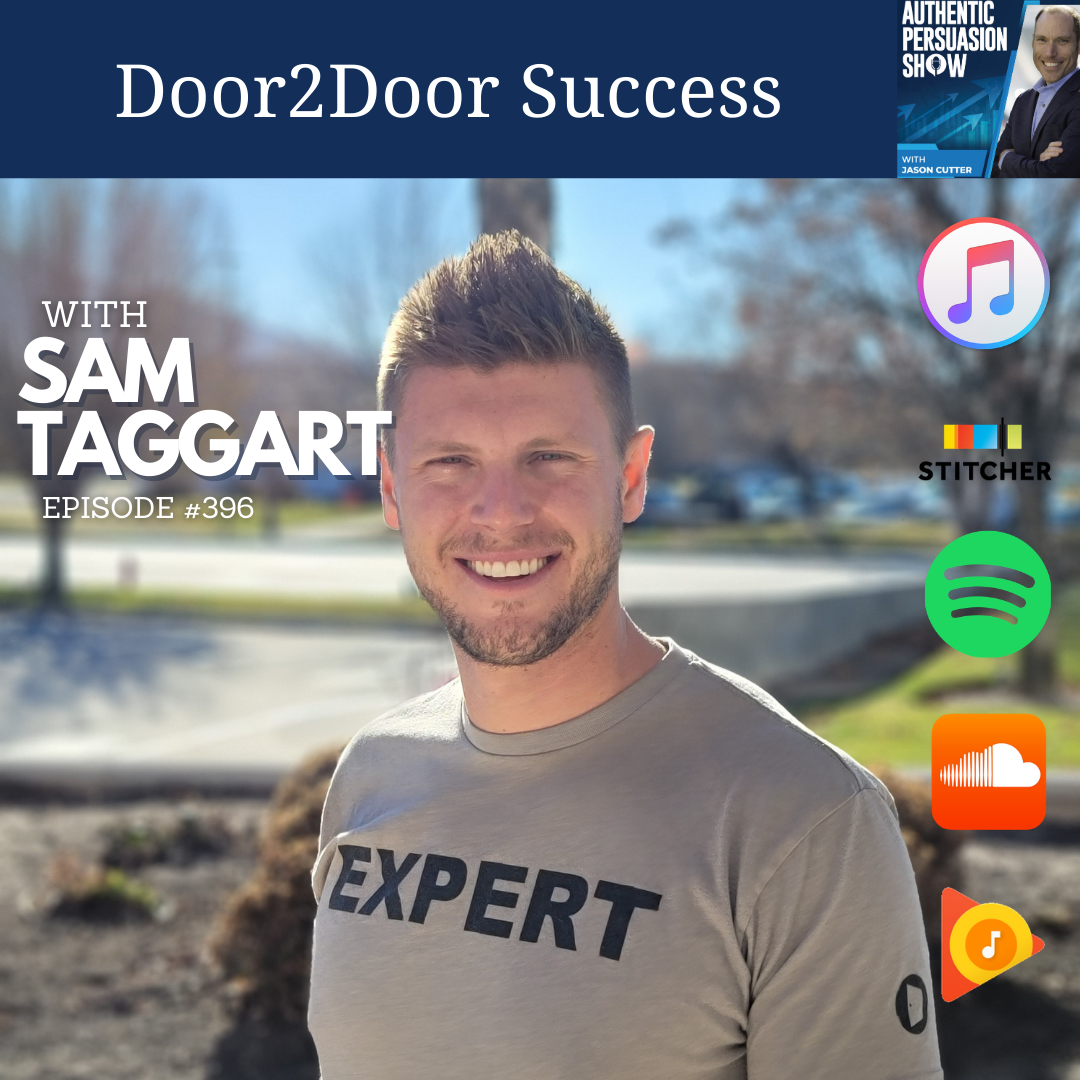Show Notes
Are you in a hiring position, challenged with finding top sales professionals to join the team?
Are you a salesperson looking to get your next great sales opportunity?
In this 4-part series, I speak with Ken Lazar from Ability Professional Network. Having helped hire over 12,000 people, he knows a thing or two about both sides of the hiring process – both from the recruiting/company end and from the new employee looking to come on board. We talk about both parts, plus what his tips for the priorities of a new salesperson when they get hired.
In Part 1, Ken and I talk about:
- Recruiting, sales and marketing require the same starting point – knowing who your ideal prospect/candidate is
- Salespeople – make sure you are a good culture fit with your company
- Finding top salespeople in this job market
Download The Power of Authentic Persuasion ebook
Enroll in the Authentic Persuasion Online Course
Connect with Jason on LinkedIn
Connect with Ken on LinkedIn
Ken’s Bio:
Ken Lazar is a Professional Recruiter and Principal in Ability Professional Network, LLC.
Having spent over twenty years in talent acquisition and professional staffing, Ken previously held the positions of Managing Director for Experis Division of ManpowerGroup and District Manager for Kelly Services. Ken’s teams have put over 12,000 people to work.
Over the course of his career, Ken has won many top sales awards including District of the Year, the Consumer’s Choice Award for “Best Staffing Agency” in Central Ohio and the Leadership Award for Influential Selling. Ken led his team to twice winning his companies highest award, the ManpowerGroup “Power Award”, for growth, profitability and community service.
Understanding the needs of top sales performers and the importance of sourcing and hiring top sales professionals, Ken and his son Matt formed Ability Professional Network, LLC. The recruiting staff at APN are specialists at recruiting sales and sales management professionals. The company’s goal is to help its clients to grow their business and their candidates to reach their career potential.
A graduate in Industrial Engineering from Kettering University with a Master of Science in Industrial Administration from the Krannert Business School at Purdue University, Ken and his wife, Nancy, reside in Plain City, Ohio.
Ken is an avid golfer, custom pen maker and owns the best dog on the planet.
Ken’s Links:
Websites:
LinkedIn: linkedin.com/in/kenlazar
Twitter: https://twitter.com/AbilityProNet
E200 – Transcript
Jason: Hey and welcome to the sales experience podcast. My name again is Jason cutter. On today’s episode I have, Ken Lazar, so having spent over 20 years focused on professional staffing. He now runs his company ability professional network, which focuses on recruiting top sales performers for his clients. Now after placing over 12,000 people into jobs, he knows a thing or two about recruiting and finding the right fit. And I’ve spent so many years dealing with candidates, recruiting and hiring. So excited to have him on the show. Ken, welcome to the sales experience podcast.
Ken: Thank you Jason. I really appreciate the invitation.
Jason: Yeah, and like I said, as soon as we connected I was thinking, man, I know this is one of the biggest challenges for most organizations, dealing with salespeople, not just the turnover, but also finding the right fit and all of that. And so for everyone listening, if you’re in sales, well probably be a very valuable episode for you to listen to, to hear, kind of look behind the curtain and into the mind of a sales recruiter. You know, then Ken is going to share. If you’re a manager and owner, obviously this is going to be great from either confirming what you’re doing on the recruiting side and it’s working well or maybe some new information. So Ken, let’s start with the recruiting process. So since at the very beginning, since the first stage is always what you read about the candidate, whether it’s a profile cover letter, resume, like what you’re seeing about them on paper, what is it that you’re typically looking for in your experience for that person who’s going to be a top performer?
Ken: Well, first of all, we start with what we call developing a profile of the ideal candidate with our client. So even though we’re hiring sales professionals, each particular assignment, it can be different with regard to the qualifications of the candidate, the education of the candidate, the experience of the candidates. So we develop a profile and then we go out and we find either in our database or using other social media candidates that meet that profile and develop a talent pool of those candidates that we start reaching out to. It’s kind of the process starts, it starts with the client and the qualifications for the position.
Jason: Got it. So starting there then, which is the step before the initial step. I know that’s so important when recruiting is to know exactly what you’re looking for the same as it is with marketing and sales. You know, you’ve got to know your prospect, what you’re going after, what are some strategies that people can use on their side to determine that? Like what does that process looking for you to break down what that ideal candidate might look like?
Ken: Well I think before we go into a process, because we’ve developed a prietary process that we go out and find candidates. I think Jason, we probably should talk a little bit about the state of the market. What’s going on out there in the sales market? How about that? So everybody knows right now, well most people know that it’s a candidate driven market. So the current unemployment rate for business to business sales professionals, which is what we typically recruit is between two and 3%, which is basically full employment. And I’m sure that you see that Jason, when you’re recruiting salespeople for your inside sales teams.
Jason: Yeah. No matter what, whether it’s business to business, business to consumer, inside, outside sales, all the good people have jobs already.
Ken: Yeah. So the people that we are talking to are people that are working or people that are in a slight transition and we’re asking them to take a look at the assignment that we have to see if it’s something that they want to take to further their career. So another metric that we should talk about is the time to hire and there’s a group out there called the DHI group and they have been monitoring time to hire probably for the past 25 years. And from the time that the job order goes out to the time that the candidate is sitting in their desk, is that for sales positions, the average time to hire right now is 48 days. No, that in itself is not significant. What is significant is the longest time to hire in recent history. So we are taking longer to hire sales professionals than we ever have.
Jason: Makes sense. That’s what it feels like in the market place as well is the, whether you’re recruiting somebody who’s already working or finding and going through the candidates that you have available, it definitely feels like that’s definitely a supply and demand issue in favor of the candidates.
Ken: Yeah. So, uh, depending upon which side of the desk that you’re sitting on, 48 days, it can be an eternity for a hiring manager that has an open territory and he’s competition are in there knocking on the doors of the territory that is vacant, that can be an eternity, especially if the last longer than that on the candidate side of the good sales, uh, professionals, their stock is really high right now and they’ve been very successful. So to you get them to move from one company to another? You really have to have a compelling story in order them to get them to move to your competition.
Ken: And what’s happening. These candidates, they’re demanding significant wage increases to switch employers. So the crazy thing that’s happening right now, and I see it all the time, Jason, is that a client will give me an assignment and will give me a budget for what the compensation ought to be. And really what the client thinks a compensation ought to be is really not as relevant as what the market is driving that compensation. So what happens is, is I give candidates and I submit them to find out that the candidates that they want with the qualifications and the education of the territory are demanding a higher wage and they’re currently paying their current employees. And that can really be a problem within, I don’t know if you were seeing that in your organization.
Jason: Yeah, I have uh, I’ve seen that recently with some clients on my side, on the consulting side where recruiting is occurring, want to bring in new reps. The wage in the market as a base wage is higher or should be higher than previous hires. You know, previous sales people that have been brought in. And then there’s an issue of what do you do about that? Uh, you bring people in higher. What about the other people on board? Always assuming that wage information is completely transparent and everyone will talk about it then you know, what kind of morale issue might you have and how do you handle that.
Ken: Yeah, so if you’re going out to hire new sales professionals, you really need to be looking at the top 15% of sales candidates in your industry. Anything below that, you’re not going to be very satisfied with the success of the sales candidates. So I think we both ought to take a look at what some traditional methods are, Jason, that people have been using to see why they’re failing. How about that?
Jason: Failing at what? Ken
Ken: Failing at getting good candidates.
Jason: Yeah, I mean, uh, that’s always a challenge. I’ve seen that forever as far as you know, is it a strategy issue? Is it a culture fit? Is it a, the message, is it the compensation, you know, in this difficult market, let’s say right now, what are you seeing most?
Ken: Well, first of all, I don’t want to step on anybody’s toes out there.
Jason: Oh go for it. Anybody who’s listening to this show for a while has gotten used to that at some point.
Ken: Well, I mean we’ll talk about some traditional methods and then we’ll talk about why they’re not working. And if you’re using these methods, I think you’re probably see the same things that I’m seeing, but we’ll just walk through them? And, and the first one of course are job boards. So, uh, job boards, you know, going back to when monster.com came on board probably about 15 years ago had been the mainstay of finding candidates. The issue is with job boards is that typically you are only looking at active job seekers and not passive job seekers. So back in the recession, the great recession, there were a lot of active job seekers out there. So you had to really, you gotta pick well, you wanted to pick off of job boards and you’re getting some good candidates. But now only about, we figure about 8% of potential sales candidates are actually active job seekers on job boards.
Ken: So I thought that that was kind of a low figure. So we got contacted by one of the major job boards and they contact me every so once in a while and want to give me access to the job boards. So they give me some free time. So this one job board contacted me and said, Ken, we’ll take all of the current job orders that you have on your website that you’re showing there and we’ll put them on our job board for 10 days just to show you how many good candidates you’re going to find that are gonna apply to your jobs and…
Jason: Trying to sell you on why you should post them on the job board and pay for that.
Ken: Yeah. And it’s a good strategy, gave me some time for free and see and I get to keep the candidates that applied and if the good candidates will, then I will buy a license, which are about $2 million. I’ll see, right now the job boards are really, really costing a lot of money. So we did it and they took our jobs and they put them on their job board and uh, we waited and some of our sales positions, yeah. Are fairly hard to fill, but we got around 80 candidates that submitted their resumes to those open positions. So guess, how many of those 80 people that submitted the resumes to our positions were actually qualified candidates?
Jason: I’m going to guess eight.
Ken: You would be high by eight.
Jason: Oh wow.
Ken: There were none, there were no candidates that applied that were even remotely, uh, qualified for the position. I mean we got things anywhere from, not that there’s anything about yoga instructors, but we’ve got everything from except sales candidates that we wanted to see. So my feeling is, right now is for sales positions. Job orders are not going to be where you need to spend a lot of your time and nor your money. So what’s your experience, Jason? Have you used job boards in the past?
Jason: I have, I’ve used them way in the past, you know, from everything from Craigslist to Monster to Indeed. And even recently in the past six months. And it’s interesting cause that same experience has happened for me on my side. Yeah. Such that what I’ve defaulted to for years is to put some hoops in place, for potentially qualified people to go through those hoops to present themselves. Instead of me filtering through the 50 or 80 or a hundred candidates that are all along the same ones you’re talking about or the people who seem to be submitting cause it’s easy and no real intention of moving forward with it. And so I make them do a little bit of work and then the right people will, you know, kind of keep pressing forward.
Ken: Well good that you have some filters in there because it takes a lot of time to go through the resume.
Jason: Alright everybody, that’s it for part one of my conversation with Ken Lazar. Make sure to go to cutterconsultinggroup.com where you can find all of Ken’s links before the final part in this mini series as well as show notes and the transcripts. Make sure to subscribe everywhere that podcasts are sold and if possible, leave a rating or review. All of that really helps and as always, keep in mind that everything in life is sales and people remember the experience you gave them.
![[E200] Sales Recruiting with Ken Lazar – Part 1 of 4](https://episodes.castos.com/salesexperiencepodcast/images/Ken-Lazar-Cover-Image.png)


